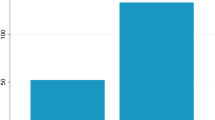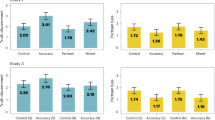Abstract
What politicians devote attention to, is an important question as political attention is a precondition of policy change. We use an experimental design to study politicians’ attention to incoming information and deploy it among large samples of elected politicians in three countries: Belgium, Canada, and Israel. Our sample includes party leaders, ministers and regular members of parliament. These elites were confronted with short bits of summary information framed in various ways and were then asked how likely it was that they would read the full information. We test for three frames: conflict, political conflict, and responsibility. We find that framing moderates the effect of messages on politicians’ attention to information. Politicians react more strongly (i.e., they devote more attention) to political conflict frames than to non-political conflict frames and they react stronger to political responsibility attributions than to non-political responsibility attributions. Conflict frames attract more attention than consensus frames only from members of opposition parties. Political conflict frames attract more attention from government party politicians. These effects occur largely across issues and across the three countries.






Similar content being viewed by others
Notes
All hypotheses laid out in this paper were generated ex ante—while designing the experiments. They were, however, not officially pre-registered.
This resulted in balanced experimental conditions when controlling for socio-demographic factors like gender, age, country, years of experience, political function (MP/party leader/minister) and partisan membership (government/opposition). For all nine experiments, we regressed the experimental condition upon those variables. None of the models was significant in its entirety. For the full models, see Online Material 2.
Data and do-file for replication can be found on the Political Behavior Dataverse (see https://dataverse.harvard.edu/dataset.xhtml?persistentId=doi:10.7910/DVN/B3YH3T).
Models with three-way interactions between country, issue and frame confirm the robustness of these results (not shown in tables). In the conflict framing model and the political responsibility model, none of the three-way interaction effects are significant, showing that there are no differences between countries in the extent to which the framing effects apply across issues. With regards to the political conflict framing model, there is one significant, positive interaction effect (Israel * Issue 2 * Political conflict framing; b = 2.57, S.E. = 1.01, p = 0.011), showing that Political conflict framing does have the expected effect in Israel for one out of the three issues—or at least that the effect is stronger for this issue than for the other two issues, where it does not work.
References
Ajzen, I. (1991). The theory of planned behavior. Organizational Behavior and Human Decision Processes, 50(2), 179–211. doi:10.1016/0749-5978(91)90020-T.
Baumgartner, F., De Boef, S. L., & Boydstun, A. E. (2008). The Decline of the Dead Penalty and the Discovery of Innocence. New York (NY): Cambridge University Press.
Baumgartner, F., & Jones, B. D. (1993). Agendas and Instability in American politics. Chicago: University of Chicago Press.
Bennett, L., & Iyengar, S. (2008). A new era of minimal effects? The changing foundations of political communication. Journal of Communication, 58, 707–731.
Blomgren, M., & Rozenberg, O. (Eds.). (2012). Parliamentary roles in modern legislatures. London; New York: Routledge.
Calvert, R. L. (1985). The value of biased information: A rational choice model of political advice. Journal of Politics, 47, 530–555.
Chong, D., & Druckman, J. N. (2007). Framing theory. Annual Review of Political Science, 10(1), 103–126. doi:10.1146/annurev.polisci.10.072805.103054.
Dalton, R. J. (2008). The quantity and the quality of party systems party system polarization, its measurement, and its consequences. Comparative Political Studies, 41(7), 899–920. doi:10.1177/0010414008315860.
Davis, A. (2009). Journalist-source relations, media reflexivity and the politics of politics. Journalism Studies, 10(2), 204–219.
Deschouwer, K., & Depauw, S. (Eds.). (2014). Representing the People: A Survey Among Members of Statewide and Sub-state Parliaments (1st ed.). Oxford: Oxford University Press.
Druckman, J. N., & Lupia, A. (2012). Experimenting with politics. Science, 335(6073), 1177–1179. doi:10.1126/science.1207808.
Entman, R. (1993). Framing: Towards clarification of a fragmented paradigm. Journal of Communication, 43(4), 51–58.
Green-Pedersen, C., & Walgrave, S. (2014). Agenda Setting, Policies, and Political Systems. Chicago: University of Chicago Press.
Iyengar, S. (1991). Is anyone responsible?: How television frames political issues. Chicago: University of Chicago Press.
Iyengar, S. (1996). Framing responsibility for political issues. The ANNALS of the American Academy of Political and Social Science, 546(1), 59–70. doi:10.1177/0002716296546001006.
Iyengar, S., & Kinder, D. R. (1987). News that matters. Television and American Opinion. Chicago: University of Chicago Press.
Jones, B., & Baumgartner, F. (2005). The Politics of Attention. How Government Prioritizes Attention. Chicago: University of Chicago Press.
Kahneman, D., & Tversky, A. (1979). Prospect theory: An analysis of decision under risk. Econometrica, 47, 263–291.
Kingdon, J. W. (1973). Congressmen’s Voting Decisions. Ann Arbor: University of Michigan Press.
Kuvaas, B., & Kaufmann, G. (2004). Impact of mood, framing, and need for cognition on decision makers’ recall and confidence. Journal of Behavioral Decision Making, 17(1), 59–74. doi:10.1002/bdm.461.
Lang, A. (2000). The limited capacity model of mediated message processing. Journal of Communication, 50(1), 46–70. doi:10.1111/j.1460-2466.2000.tb02833.x.
Lau, R., & Redlawsk, D. P. (2007). How Voters Decide: Information Processing During Election Campaigns. Cambridge: Cambridge University Press.
Leeper, T., & Slothuus, R. (2016). Can Citizens Be Framed? How Information, Not Emphasis, Changes Opinions. Aarhus: Aarhus University.
Lengauer, G., Esser, F., & Berganza, R. (2012). Negativity in political news: A review of concepts, operationalizations and key findings. Journalism, 13(2), 179–202. doi:10.1177/1464884911427800.
Miler, K. C. (2007). The view from the hill: Legislative perceptions of the district. Legislative Studies Quarterly, 32(4), 597–628. doi:10.3162/036298007782398477.
Miler, K. C. (2009). The limitations of Heuristics for political Elites. Political Psychology, 30(6), 863–894. doi:10.1111/j.1467-9221.2009.00731.x.
Neuman, W. R., Just, M. R., & Crigler, A. N. (1992). Common Knowledge: News and the Construction of Political Meaning. Chicago: University of Chicago Press.
Otieno, C., Spada, H., & Renkl, A. (2013). Effects of news frames on perceived risk, emotions, and learning. PLoS ONE, 8(11), e79696. doi:10.1371/journal.pone.0079696.
Scheufele, D. A. (1999). Framing as a theory of media effects. Journal of Communication, 49(1), 103–122. doi:10.1111/j.1460-2466.1999.tb02784.x.
Scheufele, D. A., & Iyengar, S. (2012). The state of framing research: A call for new directions. The Oxford Handbook of Political Communication Theories. New York: Oxford UniversityPress.
Schuck, A. R. T., Vliegenthart, R., & De Vreese, C. H. (2014). Who’s afraid of conflict? The mobilizing effect of conflict framing in campaign news. British Journal of Political Science. doi:10.1017/S0007123413000525.
Semetko, H., & Valkenburg, P. (2000). Framing European politics: A content analysis of press and television news. Journal of Communication, 50(2), 93–109. doi:10.1111/j.1460-2466.2000.tb02843.x.
Sevenans, J., & Vliegenthart, R. (2016). Political agenda-setting in Belgium and the Netherlands the moderating role of conflict framing. Journalism & Mass Communication Quarterly, 93(1), 187–203. doi:10.1177/1077699015607336.
Sevenans, J., Walgrave, S., & Epping, G. J. (2016). How political elites process information from the news: The cognitive mechanisms behind behavioral political agenda-setting effects. Political Communication, 33(4), 605–627. doi:10.1080/10584609.2016.1153543.
Sheffer, L., Loewen, P. J., Soroka, S., Walgrave, S., & Sheafer, T. (2015). Expertise and Efficacy in Elite Political Decision Making. Durham: Duke University.
Simon, H. (1985). Human nature in politics: The dialogue of psychology with political science. The American Political Science Review, 79(2), 293–304.
Thesen, G. (2011). Attack and Defend. Explaining Party Responses to News. Aarhus: Politica.
Thesen, G. (2013). When good news is scarce and bad news is good: Government responsibilities and opposition possibilities in political agenda-setting: When good news is scarce and bad news is good. European Journal of Political Research, 52(3), 364–389. doi:10.1111/j.1475-6765.2012.02075.x.
Tversky, A., & Kahneman, D. (1986). Rational Choice and the Framing of Decisions. The Journal of Business, 59(4), 251–278.
Valkenburg, P. M., Semetko, H. A., & De Vreese, C. H. (1999). The Effects of News Frames on Readers’ Thoughts and Recall. Communication Research, 26(5), 550–569. doi:10.1177/009365099026005002.
Walgrave, S., & Dejaeghere, Y. (2016). Surviving Information Overload. How Elite Politicians Select Information. Governance. doi:10.1111/gove.12209.
Wanta, W., & Hu, Y.-W. (1993). The agenda-setting effects of international news coverage: An examination of differing news frames. International Journal of Public Opinion Research, 5(3), 250–264. doi:10.1093/ijpor/5.3.250.
Wolfsfeld, G. (2011). Making Sense of Media and Politics: Five Principles in Political Communication. Routledge: Taylor & Francis.
Yantis, S. (2000). Goal-directed and stimulus-driven determinants of attentional control. Attention and Performance, 18, 73–103.
Acknowledgements
The paper draws on data gathered in the framework of the INFOPOL-project. INFOPOL is supported by the European Research Council (Advanced Grant ‘INFOPOL’, No. 295735) and the Research Fund of the University of Antwerp (Grant No. 26827). Stefaan Walgrave (University of Antwerp) is principal investigator of the INFOPOL project, which has additional teams in Israel (led by Tamir Sheafer) and Canada (led by Peter Loewen).
Author information
Authors and Affiliations
Corresponding author
Electronic supplementary material
Below is the link to the electronic supplementary material.
Rights and permissions
About this article
Cite this article
Walgrave, S., Sevenans, J., Van Camp, K. et al. What Draws Politicians’ Attention? An Experimental Study of Issue Framing and its Effect on Individual Political Elites. Polit Behav 40, 547–569 (2018). https://doi.org/10.1007/s11109-017-9413-9
Published:
Issue Date:
DOI: https://doi.org/10.1007/s11109-017-9413-9




